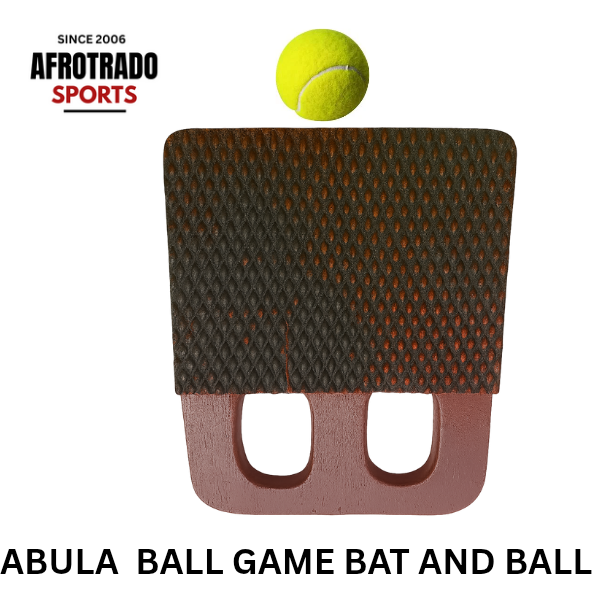
ABULA BALL GAME
HISTORY OF ABULA GAME
Abula is a ball game invented by Mallam Elias Foluso Yusuf and played with a uniquely designed Abula bat which has built in safety measures.

The game is played in a court of 16m x 8m over a high net of 2.44m from the turf. It is a four aside game with four substitutes allowed on each side, substituting only twice in a set. There are 13 major rules and regulations guiding the game. It is a very popular in schools, clubs and national competitions. It received IOC patronage in 1994 through Sport for All and the Nigeria Olympic Committee.

PICTURE: Inventor of Abula Ball Gam, Mallam Elias Foluso Yusuf playing Abula
It is now a regular medal scoring event at the Biennial National Sports Festival in Nigeria scoring 3 gold,3 silver and 3 bronze medals in male, female and mixed doubles categories as recorded at IMO 98,BAUCHI 2000 and EDO 2002.It is recognized by the Nigerian School Sports Federation and NUGA(Nigerian University Games Association) for championship tournaments.
The Federal Ministry of Education has also recognized Abula for the school curriculum in Primary and Secondary schools in Nigeria (2001) Abula was built to be in Montreal Canada at the 4th World Festival of Traditional Sports in 2004.The game was invented in 1984 by Elias Yusuf, basing his invention (of the game) on principle of balanced diet called Abula which has being in existence as old as the civilization of the yorubas in south west of Nigeria.
ADVANTAGES OF ABULA GAME
(i) It is very interesting.
(ii) It is cheap to establish.
(iii) It is simple to understand and master.
(iv) It is very recreative and competitive.
(v) It is for both sex 1.e. for male and female to play together shoulder to shoulder in the same court promoting the spirit of BEIJING 1995.
(vi) It is very popular among school children.
(vii) It is a very safe sport in comparison with some other gruesome sports.
(viii) It economizes space especially in cities where land is a scarce resource.
(ix) It has interesting varieties such as Abula Family Game (AFAGA) and Fitness Abula which are very good for recreational purposes.
RULES AND REGULATIONS OF ABULA BALL GAME
SUBSTITUTION
- There are four substitutes for each team making a total of eight players for the team.
- In a mixed team, female substitutes a female (player) while a male for a male (player) respectively.
- Only two substitutes are allowed in an encounter/game.
RULE 11
BAT HOLDING
- The bat is held by the handles.
- Use only the face of the bat to contact the ball.
RULE 12
OFFICIALS
Apart from the match commissioner, there shall be eight officials, made up of the followings: One Referee, One Umpire/Assistant Referee, Two Scorers (1 table and one score board), and four linesman. The Referee controls the game with a whistle.
RULE 13
TIME OUT
- A team is allowed a maximum of two time outs in a game.
- A time out lasts for 30 seconds.
- A change over period between one game and another is two minutes.
FAULTS THAT CREATE POINTS IN ABULA GAME
- While playing the ball, if the bats of the two players of the same team touch each other while contacting the ball, the team is at fault,(bat clash or aided contact, it is a fault).
- Touching the ball in succession by a player is a fault. It is double contact.
- Only the face of the bat should be used to contact the ball. Any other part is a fault.
- Out ball is a fault against the last player.
- Block out is a fault against the blocker.
- More than three touches from a side before playing the ball to the opponent’s court is a fault.
- Wrong service is a fault leading to loss of points gained by it through faulty rotation.
- Touching the net with your body or bat when the ball is in play is a fault.
- If the ball hits the bat and the bat hits or touches the ground as a result, it is a fault.
- Throwing the bat to the ball is a fault.
- Backhand play is a fault.
- Ball touching the net directly from a serve is a fault.
- Serving the ball out of court is a fault.
- Faulty service e.g. not being able to serve ball over the net is a fault.
- Serving inside the court is a fault.
- Stepping /overstepping the dividing line of the court is a fault.

